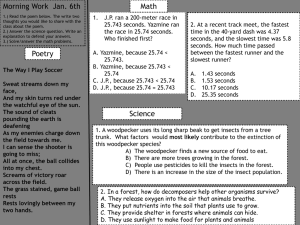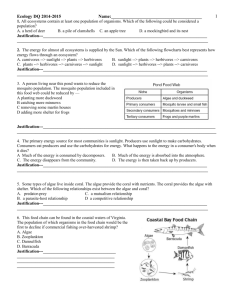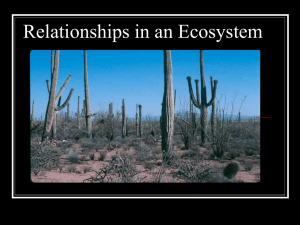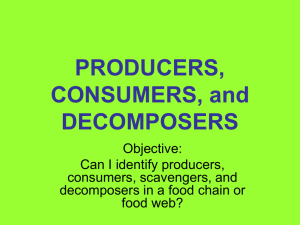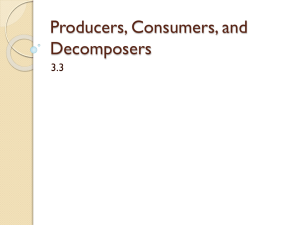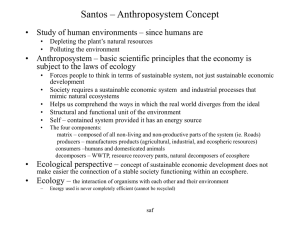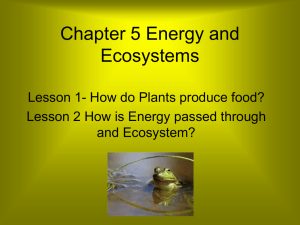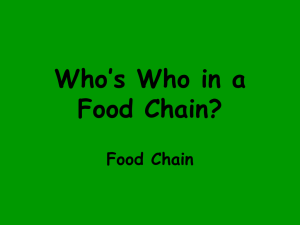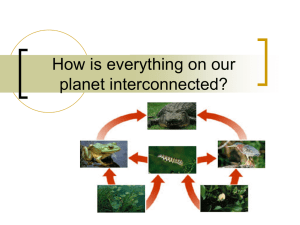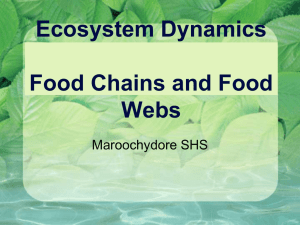Ecology CRCT Practice - Effingham County Schools
advertisement
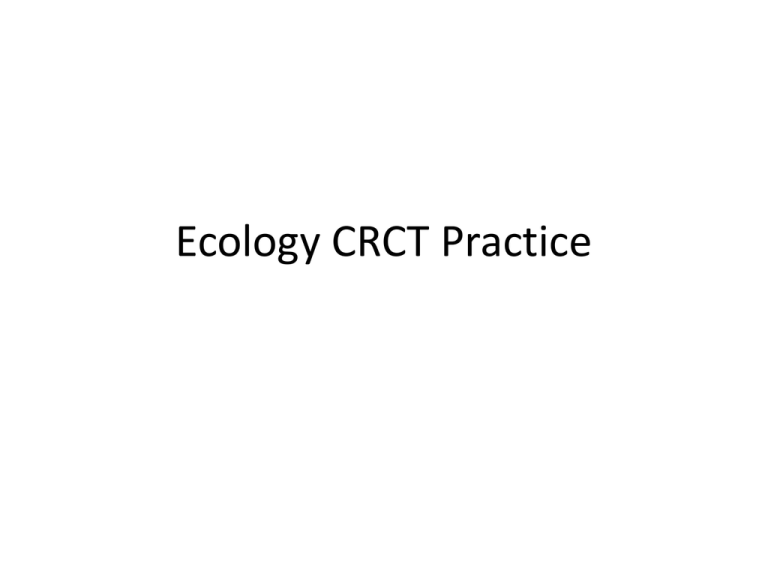
Ecology CRCT Practice 23. An energy pyramid containing autotrophs and other organisms from a food chain is represented below. Carnivores would most likely be located in (A) level I, only (B) (B) level I and level II (C) level III, only (D) level II and level III (C) level III, only 21. Many species of plants interact with harmless underground fungi. The f ungi enable the plants to absorb certain essential minerals and the plants provide the fungi with carbohydrates and other nutrients. This describes an interaction between a (A)parasite and its host (B) scavenger and a decomposer (C) predator and its prey (D) producer and a consumer (D) producer and a consumer The diagram below represents a pyramid of energy that includes both producers and consumers. The greatest a mount of available energy is found at level (A) 1 (B) 2 (C) 3 (D) 4 (A) 1 30. When brown tree snakes wer e accidentally introduced onto the island of Guam, they had no natural predators . These snakes sought out and ate many of the eggs of insect-eating bir ds. What prob ably occurred following the introduction of the brown tree s nakes? (A)The bird population increased. (C) The bird pop ulation began to seek a new food source. (B) The insect population increased. (D) The insect population began to seek a new food source. (B) The insect population increased. 32. If the frogs feed on insect larvae, what is the role of the frogs in this pond ecosystem? (A)Herbivore (B) parasite (C) consumer (D) host C) consumer 9. What type of succession is most likely to happen in the Figure? a. secondary c. teriary b. climax d. primary a. secondary The removal of nearly all the predators from an ecosystem would most likely result in (A)an increase in the number of carnivore species (B) a decrease in the size of decomposers (C) a decrease in new predators migrating into the ecosystem (D) an increase in the number of herbivores (D) an increase in the number of herbivores How much energy would be available to the organisms in level C? (A) all of the energy in level A, plus the energy in level B (B) all of the energy in level A, minus the energy in level B (C) a percentage of the energy contained in level B (D) a percentage of the energy synthesized in level B and level D (C) a percentage of the energy contained in level B Where in the Energy Pyramid below would Producers be placed in? A) A B) B C) C D)D A) A 3. What is the correct series of steps for the movement of energy in a food chain? a. producers consumers scavengers and recyclers sun b. sun consumers producers scavengers and recyclers c. sun producers scavengers and recyclers consumers d. sun producers consumers scavengers and recyclers Which of the examples below can BEST be described as mutualism between animals? a. a tapeworm lives in the intestine of a bird and consumes the food that the bird has eaten b. mountain lions and wolves fight eachother for the same deer c. a bird eats parasites off of a rhinoceros while the rhinoceros provides protection to the bird d. rats live in the garbage dump of a town and rarely interact with people c. a bird eats parasites off of a rhinoceros while the rhinoceros provides protection to the bird Which ocean organism is considered a producer? a. b. c. d. phytoplankton zooplankton small fish whales a. phytoplankton 5. Roberto feeds his pet iguana a mixture of salad greens, carrots, squash, crickets, and worms as part of his regular diet. What type of consumer is the iguana? a. b. c. d. herbivore carnivore omnivore decomposer c. omnivore Organisms that absorb nutrients from dead plants and animals are called — a. carnivores. b. decomposers. c. herbivores. d. producers. b. decomposers. 25. The spotted turtle is common in fresh water. It eats insects, tadpoles, dead fish, and tender aquatic plants. Which of these best describes the spotted turtle? a. A herbivore b. A carnivore c. An omnivore d. A decomposer c. An omnivore Which organism shown in the pyramid receives the highest percentage of energy from the Sun? a.fox b. grass c. grasshoppers d. birds b. grass Which population would directly increase if the population of owls decreased? A. Mice B. Rabbits C. Frogs D. Foxes C. Frogs Which of the following best describes an energy pyramid? A. Shows how energy is lost as you move up a food chain. B. Shows the effects of losing a top predator in an ecosystem. C. illustrates the many possible interactions among organisms in an ecosystem. D. Shows the importance of decomposers in an ecosystem. A. Shows how energy is lost as you move up a food chain. How can food chains be misleading? A) They show many possible pathways of energy flow in an ecosystem B) They only show one possible pathway of energy flow in an ecosystem C) They do not show the proper order of energy flow in an ecosystem D) They don’t include tertiary consumers B) They only show one possible pathway of energy flow in an ecosystem Out of the following consumers, which would most likely be found at the top of a food chain? A) Herbivores B) Carnivores C) Omnivores D) Scavengers D) Scavengers At each successive feeding level in an ecosystem, the amount of available energy a. Increases b. Decreases c. Remains the same D. Doubles b. Decreases 3. The organisms growing on the log in Figure 2-8 are ____? a. autotrophs b. producers c. decomposers d. carnivores c. decomposers
